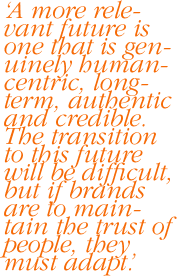

 |
 |
Chapter summary
A brand of enlightenment
This chapter can be downloaded here free, as a pdf file.
For more than 200 years the ideas of commerce, toleration, human progress and happiness that the enlightenment espoused has guided our thinking. But our sense of well-being is no longer so certain. In the twenty first century it is no longer axiomatic that increased wealth means a better life. What progress now means is not so clear. And the contribution brands can make to our individual freedom is questionable.
Under fire, from all sides, brands have reached a watershed. There is a choice to be made. The managers of brands can choose to do more of the same. Or they can reassert the relevance of brands. The same is short-termist and sustains past failings such as exaggeration (over promising and under delivering), expediency (focusing on shareholder returns at the expense of other audiences) and execution (the inability to meet your promises). A more relevant future is one that is genuinely human centric, long term, authentic and credible. The transition to this future will be difficult, but if brands are to maintain the trust of people, they must adapt.
The impetus for change will come from a variety of sources. The power of consumers dictates that there will be self correction, as companies adapt to the demands for ethical behaviour. The power of shareholders, pressure groups and the media will define the need for openness and honesty. The need for a unity of interest between employees and managers will lead to greater democracy and transparency. Finally, government will use legislation to change the way organizations think and behave.
The goal of marketers should be to help build an open society
that puts the individual at its centre; a society that praises intellectual
honesty and truth and lays down alongside the creed of freedom the idea
of responsibility—that we must all work to improve the world in which
we live. The focus here is to argue for open organizations that encourage
a similar freedom for people to choose. To do so businesses have to be
willing to engage in a wider world than the narrow focus of shareholder
returns. And they have to enable people to make free and informed choices
about the brands that help them define their individuality. The ideas
of enlightenment are not dead. In many respects they are more relevant
than ever. But there does need to be new thinking about progress, people
and the nature of happiness. Beyond Branding is in the vanguard
of that process.
Next chapter: Whose brand is it anyway?
